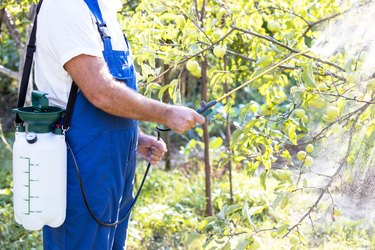
The times they are a-changing, and, in some ways, changing for the better. Some years ago, even a dedicated organic gardener was obligated to resort to powerful chemical insecticides on occasion to tamp down insect pests taking out an apple or stone fruit crop. Today, simple organic sprays combined with new, wild and wonderful organic options, can truly protect a home orchard.
Plant-Based Horticultural Oils
Video of the Day
Horticultural oils have long been the organic spray of choice to control scale and some plant diseases. They are petroleum- or plant-based pesticides that are specifically designed to control plant pests. They are called dormant oils when applied in late winter to control scale bugs. These oils are valuable tools in the organic orchard, where they can be used to control pests that overwinter in bark crevices.
Video of the Day
Commercially available horticultural oils are highly refined petroleum products. They are filtered and distilled to remove harmful compounds and are 92 percent to 99 percent pure. They are filtered, then formulated with a mixing agent to blend with water. Plant-based horticultural oils use soybean, cottonseed, sesame, Neem, or other oils.
Horticultural oils kill pest eggs and larvae by smothering them. That means that you have to apply them to all parts of a fruit tree, including the branches, trunk, and both sides of the foliage.
If you are making your own, use a heavy spray, similar to a commercial dormant oil spray, and infuse with botanicals, such as hot peppers and garlic, to add repelling power to the insecticidal properties of the oil spray. Dilute the oil mixture in water, using a ratio of about 20 to 25 parts water to 1 part of the oil mixture, more oil per water for late winter sprays and less oil per water for summertime sprays.
Insecticidal Soap Sprays
Insecticidal soap is a low-toxicity bug control solution popular with organic gardeners. If you use it regularly, it protects plants without the use of harsh chemicals. That's because the active ingredients in insecticidal soap are potassium salts of fatty acids, created when the chemical compound alkali mixes with the fatty acids found in natural oils, including castor oil, coconut oil, and olive oil.
The resulting mixture kills soft-bodied garden pests. Yes, this means aphids, but also mites and mealybugs, without harming beneficial insects. It is only effective when wet, so reapplications are essential. Make your own by combining 2 1/2 tablespoons of mild liquid dish soap and 2 1/2 tablespoons of vegetable oil into 1 gallon of water. Blend well.
Sex Pheromones, Anyone?
Isomate-C protects apple trees. Isomate-M is a weapon against the oriental fruit moth and oriental fruit fly. What are these Isomates? They are sex pheromones, artificially produced but just as enticing as the real chemicals that female pests emit to attract males. Pheromones are available for use in most major pest traps, including Japanese beetles, peach twig borers, and apple and peach maggot adults.
Gardeners with orchards can soak plastic strips in these Isomates and hang them in the trees when the petals are dropping. The strips give the entire orchard the scent of lepidopteran fragrance and the male pests are confounded.
The males cannot locate the females to mate, which means an enormous reduction in fruit damage, up to 98 percent less. That's a more impressive result than any chemical produces, and no other plants or species of bugs are affected. It's not possible to make your own but with costs at some $50 to $100 an acre, you just can't beat it.